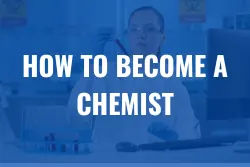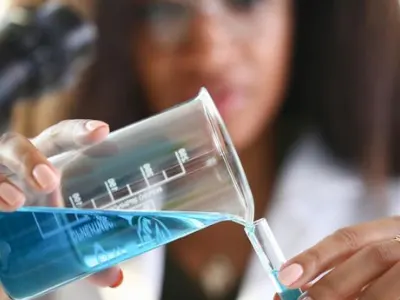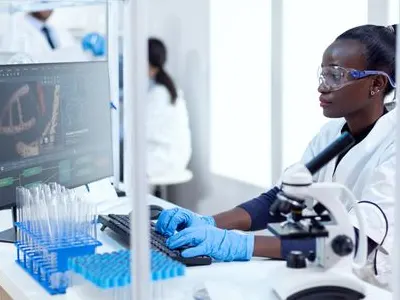Last Updated: July 2nd, 2022 by

Career Shortcuts
Chemists have a variety of specialties and career paths to choose from based on their skills and job preferences, but there are quite a bit of steps to learn how to become a chemist.
This article discusses what a chemist is, explains how to become a chemist, and lists some career options you can pursue as a chemist.
We hope this information helps you decide if becoming a chemist is the right choice!
Visit our Career Guide for a list of all our job insights for an in depth look at the new career path you are considering.
What is a Chemist?

A chemist is a scientist who studies chemicals and their reactions. They may work in a lab to create new products or work in manufacturing to develop and test new processes.
Chemists may also work in environmental science, studying the impact of chemicals on the environment.
In addition, chemists may work in medicine, developing new drugs and treatments. There are many different fields of chemistry, and each area has its unique challenges.
Chemists must have a strong understanding of math and science to be successful.
They must also be able to measure and calculate the properties of different chemicals accurately. In addition, chemists must communicate their findings clearly and concisely.
Chemists play an essential role in society, and their work helps us to better understand the world around us.
Read our related article on How to Become a Scientist. We explore various careers in the field of Science and how you can get started.

Career Guide
How to Become a Chemist

When contemplating how to become a chemist, it requires an individual to complete some steps, including the following:
Get a Bachelor’s Degree
You must have a bachelor’s degree in chemistry to be a chemist.
Although a master’s degree or doctorate may also be required for some research positions, many entry-level chemist jobs only require a bachelor’s degree.
In addition to taking courses in chemistry, you should also take classes in physics and math. These courses will give you the scientific foundation to succeed in chemistry.
Many colleges and universities offer bachelor’s degrees in chemistry, and some even offer specialized programs in biochemistry or forensic chemistry.
Once you have earned your bachelor’s degree, you will be ready to begin your career as a chemist.
Read More: How to Become a Marine Biologist. Interested in other fields of science? Study marine life in this career path!
Gain Work Experience
Becoming a chemist takes more than just completing a degree in chemistry.
Many employers also require laboratory experience, which can be obtained by working as a technician in an industrial, academic, or government research laboratory.
Alternatively, some students choose to do an internship as part of their degree, which gives them the chance to gain real-world experience and learn new skills while in school.
Upon graduation, most chemists will start their careers working in a team of scientists on specific projects.
As they gain more experience, chemists may move into managerial roles or become independent consultants.
A chemist can take many different career paths, but they all require hard work and dedication.
With the right attitude and a willingness to learn, anyone can succeed in this field.
Obtain a Graduate Degree
Becoming a chemist usually requires a bachelor’s degree in chemistry, although a bachelor’s degree in another science may be acceptable.
Employers also value practical experience, so internships or participation in cooperative education programs can be helpful while you’re an undergraduate.
Many research positions require a master’s degree or Ph.D., so if you’re interested in working in this field, you may need to continue your education.
While enrolled in a graduate program, you’ll have the opportunity to specialize in an area of interest and conduct original research, which will prepare you for a career as a chemist.
After completing your degree, you may choose to work in academia, government, or the private sector.
Chemists who work in the industry typically specialize in a particular area, such as materials science or nanotechnology.
Those who work for the government may be employed by organizations like the Environmental Protection Agency or the National Science Foundation.
Academia is another option for chemists; many teach at colleges and universities, while others conduct research at research institutes.
With a graduate degree in chemistry, you’ll have the knowledge and skills necessary to pursue any of these career paths.
Job Outlook

Becoming a chemist is not an easy task, but it is a gratifying career. According to the Bureau of Labor Statistics, the median annual wage for chemists was $77,630 in May 2019.
The job outlook for chemists is projected to grow by 3% from 2019 to 2029, about as fast as the average for all occupations.
The demand for chemists will continue to grow as society becomes increasingly reliant on new and innovative chemicals and products.
If you are interested in becoming a chemist, you should take courses in chemistry and other sciences.
You can also gain experience by working as a Laboratory Technician or Research Assistant.
Read our related article on Pharmacy Jobs. We explore pharmacy jobs and how you can get started!
Importance of Chemists to the Society
Chemistry is essential to our everyday lives.
Everything we do and touch involves chemistry, from the food we eat and the water we drink to the air we breathe and the clothes we wear.
Chemists play a vital role in ensuring that our products are safe and effective.
They develop new materials and processes that make our lives healthier, cleaner, and more comfortable.
They also work to protect our environment by developing ways to clean up pollution and develop sustainable resources. In short, chemists make the world a better place to live in.
While most people only think of chemistry when they think of scientists in white lab coats working with beakers and test tubes, the truth is that chemists are involved in nearly every aspect of our lives.
Chemistry is also essential for developing new technologies that make our lives easier, safer, and more efficient.
Check out this video on Chemistry Careers for a peak into the work life of a Chemist:
FAQs
Q: How Long Does it Take to Become a Chemist?
A: It usually takes about 4 years to earn a bachelor’s degree in chemistry, although a bachelor’s degree in another science may be acceptable.
Employers also value practical experience, so internships or participation in cooperative education programs can be helpful while you’re an undergraduate.
Q: What Do Chemists Do?
A: Chemists conduct chemical analyses of substances to determine their properties, composition, structure, and interaction.
They use this information to develop new products or processes or improve existing ones.
Other Interesting Articles
